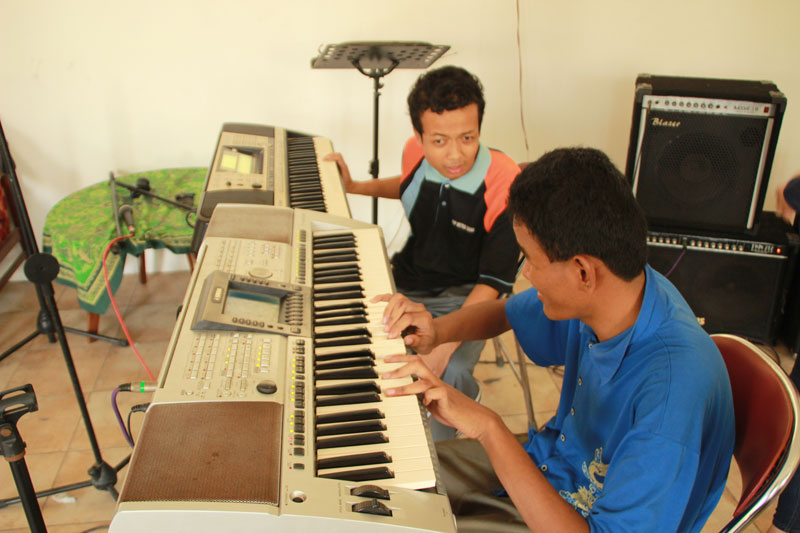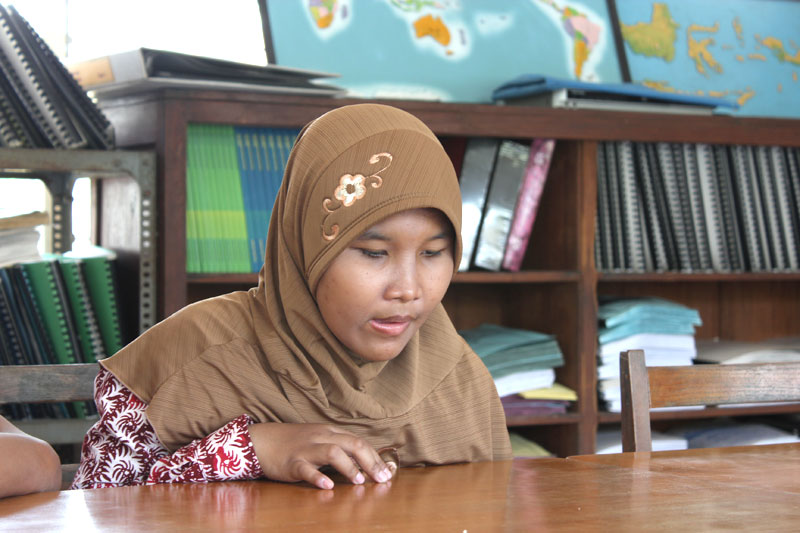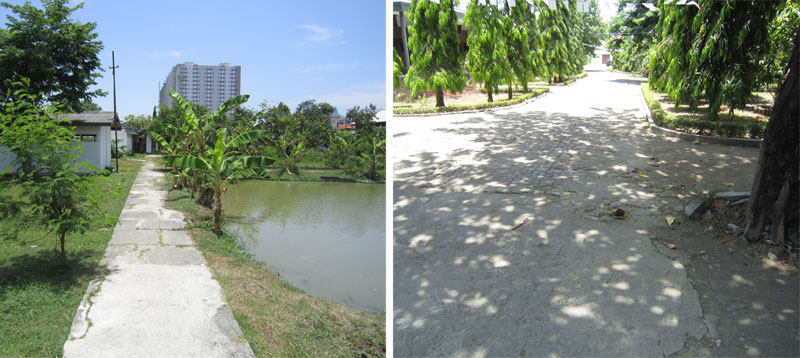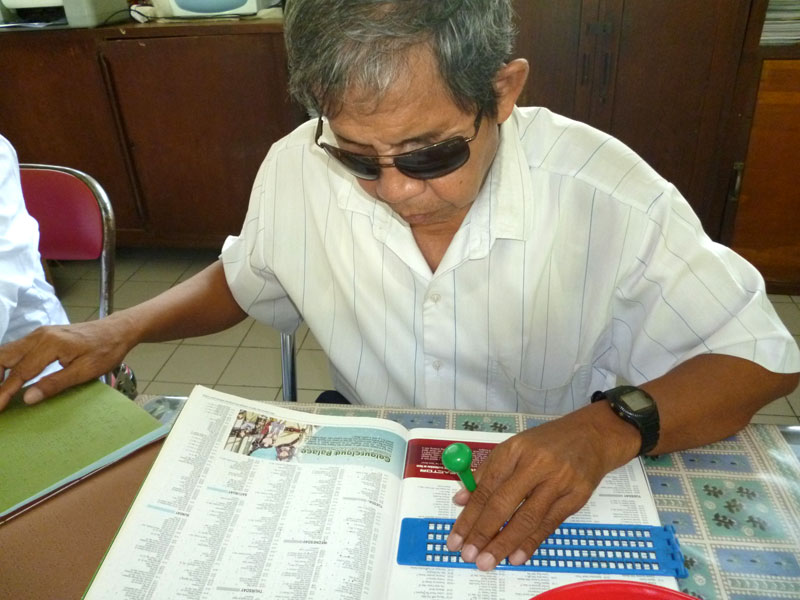
Loss of vision is an unpleasant experience, an experience that isn’t chosen. But on the other hand, the inability to see can be an advantage for them because of their growing sensitivity to the other senses.
Limitations of sight for the blind are generally divided into two: not being able to see at all (total blindness) and still being able to see faintly (low vision). People who are totally blind completely rely on their sense of smell, hearing, and touch to move and do everyday activities, so they need a certain stimuli to conduct their activities with ease. While blind with low vision (low vision) can still use a bit of their eyesight. They need color distinction in their environment in order to move and do their activities easily. Needs of tunenetra are more often accommodated in cities rather than in rural areas,. Surabaya is no exception.
Here, three teachers and three students in SMPLB A YPAB can paint a picture of the ease of movement and activity in the city of Surabaya. SMPLB A YPAB who are on the road Gebang White no. 5 provides for the school education of the blind. At this school there are 27 students, consisting of 11 women and 16 men.
Students
Alfian

Alfian (right) and Rizky (left). Photo: Gunawan Tanuwidjaja, et al, 2012.
Alfian is a 15 year old student and is totally blind. Alfian became blind at the age of 3 months because of a hydrocephalus virus. He loves to sing and play musical instruments, particularly drums. Alfian is currently in ninth grade. Alfian had attended kindergarten Extraordinary Primary Type A and Type A Extraordinary, Foundation for Blind Children Education (TKLB A YPAB and SDLB A YPAB) on the road Tegalsari 56 Surabaya, so Alfian already familiar with the Extraordinary School.
Alfian spends his daily activities in SMPLB A YPAB from Monday through Friday as students living in dorms in general. Every morning at 7, Alfian and his friends have their breakfast in the dining room. Then they prepare themselves to go to school.
Between the hours of 8:00 to 12:30, Alfian and his colleagues go to class and learn a variety of subjects such as Physics, Mathematics, Indonesian, English, Biology, Social Sciences (IPS), Civic Education (PKN), Religion, Information and Computer Technology (ICT), RH (reproductive health), Sport and Skills and Arts and Culture.
Then, at about 12.30, Alfian and his friends enjoyed a simple lunch in the dining room with joy. Usually this is followed by a lunch break, cleaning up and prayers’ time. After dinner at 18.00, Alfian enjoys playing music. Often he plays pop songs he really likes, right now his favorite songs are by Wali.
Alfian also takes advantage of extra hours to play angklung in the music room. Often, the SMPLB A YPAB team is invited to play angklung in various places and play a range of music genres such as pop, traditional Javanese music, Chinese and more. These activities foster their confidence and increase opportunities for the blind to socialize.
In addition to activities in class, Alfian and his friends like to read books in the library, computers in the computer room and play ping pong in the gym.
To get home at the end of the week, Alfian rides a bemo going to his house on Jalan Demak Margodadi. He explains that getting home is a challenge because of the uneven pavement, potholes in the sidewalks, and difficulty stopping public transport.
Sofiatil Ilmi

Sofiatil Ilmi. Photo: Gunawan Tanuwidjaja, et al, 2012
Sofi is 15 years old and was born in Surabaya. She aspires to become an Indonesian language teacher, inspired by her teachers at YPAB. She has experienced periodic blindness since kindergarten caused by interference with the nerves in her eyes. From the age of 5 to 11 years old she could still see vaguely (low vision), but then suffered total blindness. She started her 3rd grade in SDLB A YPAB and then proceeded to SMPLB A YPAB. Since she lives nearby in Tenggilis, her parents drop and pick her up by motorcycle every day.
Sofi is an eighth grader and explained that she faces difficulties daily at SMPLB A YPAB despite having been trained in Orientation and Mobility (OM) when she started at the school. This training helps the visually impaired move, particularly in a new environment, is intensive and can take a long time, from a week to a month, depending on the environment and frequency of use. Students are trained by teachers to recognize certain signs – a sign of the environment as a standard in the moving and active. This will facilitate the activities of the blind and protect them from potential dangers in the neighborhood.
Sofi admitted often being turned around in a part of the school that used to be a field, and there are some classes that she has never gone to. The school environment needs to be more accessible. SMPLB A YPAB used to be an Agricultural High School, so it is not designed to be accessible for blind students.

The school was originally an agricultural school, so it wasn’t designed with accessibility in mind. Photo: Gunawan Tanuwidjaja, et al, 2012.
On the other hand, Sofi becomes more sensitive to the things that happen in the environment. She can distinguish the sound of approaching footsteps. She can also distinguish friends and colleagues from their smells. Other senses of the blind become more developed and sensitive and become assets.
Rizky
Rizky Rahmadani is of the same age as Sofi, and was educated at the same junior high school. He came from Jombang with low visibility (low vision), but became totally blind less than 1 year ago. He is still adapting. Rizky lives in the dorm and goes back to his parents’ house once a week.
Rizky’s hobby is playing football. The students often play on the grounds behind SMP YPAB. They are always very excited to play. They attach a bell to the ball to help them find it. If the ball stops rolling, they have to sweep the field until they find it. This is a challenging activity for them, but is an excellent hobby that gives them good exercise.
Alfian, Sofi and Rizky hope to be understood and appreciated by the citizens of Surabaya because the city is not as friendly to them as it could be. When they bump into other people when they are walking, often they are immediately scolded. We sometimes do not understand the limitations of blind and still condescend to them. Sidewalks are often crowded by rickshaws, motorcycles, and even parked vehicles. The students speak of many difficulties because of the chaos of Surabayan sidwalks. This results in them often getting hit by other pedestrians.
Guru
Three teachers also were interviewed. They are Madoeri, Atung Yunarto, and Tutus Setiawan.
Pak Madoeri
Mr. Madoeri is the most senior teacher in SMPLB A YPAB and he is 61 years old. He is currently living in Manukan, Tandes. Every day he takes a roundtrip minibus (lyn) from and to SMPLB A YPAB. Pak Madoeri has been totally blind since the age of 2 years as a result of a fever. Pak Madoeri teaches Indonesian, Art and Culture, and Massage. He enjoys his life with a wife, children and grandchildren.

Pak Madoeri, a senior faculty, currently writing Braille. He’s also a professional masseuse available on call. Foto: Gunawan Tanuwidjaja, et al, 2012
In addition to teaching, Mr. Madoeri is also a professional masseuse, available upon request. Massaging skills is an advantage of the blind that can be felt directly by the society. This work can meet the financial needs of Madoeri. So these skills are also taught in SMPLB A YPAB, although masseuse work is not the only job for the blind. Pak Madoeri often explores the city of Surabaya. This can be quite tricky since there are no clear markers on the sidewalk, as well as public transport. According to him, falling or getting feet stuck in holes while walking, are common for the blind. The needs of the visually impaired have not yet been embodied in the city’s public spaces.
Pak Atung Yunarto
Atung Yunarto teaches Science, Physics, Mathematics and massage in SMPLB A YPAB. He suffered a gradual loss of vision (low vision) 14 years ago. At that time, he had graduated from the University of Jember and was teaching at the University of Hang Tuah. But after experiencing blindness, he resigned and had a short period of distress. This is often experienced by visually impaired peers who suddenly lose his eyesight.

Pak Atung Yunarto teaches science, physics, maths, and massage. Foto: Gunawan Tanuwidjaja, et al, 2012.
Atung has been teaching for more than 11 years. He is enjoying his role as a teacher and also develops social activities at the Institute for Blind Empowerment (LPT). LPT is does blindness education for the layman, advocacy towards governments and the public about the needs of blind human rights. This shows the importance of the rights of the blind because they are discriminated against in employment, education and accessibility.
Pak Tutus
Tutus suffered total blindness at the age of 8 years old, after crashing into a wall at his school. Tutus teaches Indonesian Language and Information Engineering and Computer. This represents the capability of the visually impaired, they can develop their abilities in computers if they have the tools – the right tools. There is potential that needs to be developed.

Pak Tutus teaches Indoensian Language, Information Science and Computer. Photo: Gunawan Tanuwidjaja, et al, 2012.
The totally blind like Madoeri and Tutus are willing to move in the city though their journeys are often difficult. They enjoy walking in the city. Unfortunately, there is no place that is really accessible, even on the sidewalks of Jalan Basuki Rahmat or Darmo that have been well designed. Tiles guide for the blind is not prominent enough and is not placed properly, thus creating confusion and harm to the blind.
We often overlook the need and rights of others, in this case, the blind. They need access to education and to work, equal protection under the law, social equality, and economic and physical rights. They have a lot of potential because of their unyielding attitude, their daring to try new things, their humility and willingness to make sacrifices. Their potential may be initially channeled towards health (masseuse) and music (music player) but in fact their potentials is unlimited. Many people become involved in education (teachers and lecturers), telecommunications (telephone operators), engineering (computer operator and programmer). All of this is possible if they are well educated by strong schools.
English translation edited by Martine Randolph.
This post is also available in: Indonesian



